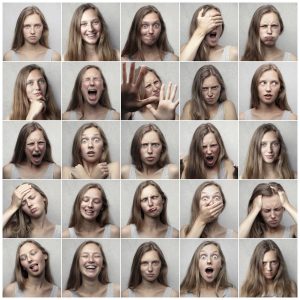In this group you can find the list of all Emotions divided by related/affected meridian.
You can also see all related emotions in the "Is balanced by" section of every Primary meridian/channel.
What are emotions?
Emotion (as defined by Merriam Webster Dictionary): A conscious mental reaction (such as anger or fear) subjectively experienced as strong feeling usually directed toward a specific object and typically accompanied by physiological and behavioural changes in the body.
Emotions are very powerful and it is easy to see some as better or worse than others, but it is important to remember that there are no ‘negative’ emotions; there are only emotions that are out of balance. In Muscle Response Testing, we can test for emotions in order to gain a deeper understanding of a goal or a stress that a person is working with, to identify an emotional imbalance, and even as a method of correction.
In Chinese Medicine, each emotion is related to one of the Five Elements and to one of the meridians within that element.
In TCM, Suwen (The Book of Plain Questions) says "The five yin-organs of the human body produce five kinds of essential Qi, which bring forth joy, anger, grief, worry, and fear." TCM also believes that certain organs are related to emotional activities, i.e. the heart is related to joy, the liver to anger, the spleen to pensiveness, the lungs to anxiety and the kidneys to fear.
Also other healing systems associate emotions to structures and functions of the body.
See also the vocabulary definition of: Emotion
How emotions can cause diseases (TCM)
The emotions are considered the major internal causes of disease in TCM. Emotional activity is seen as a normal, internal, physiological response to stimuli from the external environment. Within normal limits, emotions cause no disease or weakness in the body. However, when emotions become so powerful that they become uncontrollable and overwhelm or possess a person, then they can cause serious injury to the internal organs and open the door to disease. It is not the intensity as much as the prolonged duration or an extreme emotion, which causes damage. While Western physicians tend to stress the psychological aspects of psychosomatic ailments, the pathological damage to the internal organs is very real indeed and is of primary concern of the TCM practitioner.
Excess emotional activity causes severe yin-yang energy imbalances, wild aberrations in the flow of blood, qi (vital energy) blockages in the meridians and impairment of vital organ functions. Once physical damage has begun, it is insufficient to eliminate the offending emotion to affect a cure; the prolonged emotional stress will require physical action as well. The emotions represent different human reactions to certain stimuli and do not cause disease under normal conditions.
Emotions can cause diseases:
- Directly impairing organ qi (vital energy)
- Affecting the functions of organ qi (vital energy)
- Deteriorating effects of emotional instability

